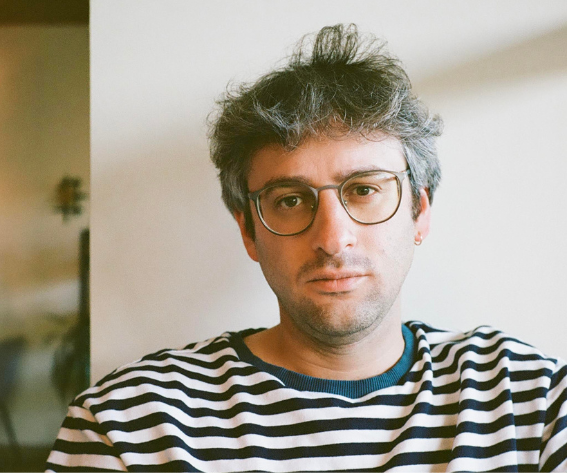Despite its mere 28 days, February was stacked in terms of high quality films here at TMFF. Mirroring the quality of releases in theatres, we had a hard time choosing a winner – in the end, Umbral was the one triumphing above the others, capturing our attention and imagination with its dark, unsettling representation of one of Sigmund Freud’s observations.
JL: Congratulations for the win, Miguel! How has Umbral been received so far at competitions?
MA: Thank you! We’re absolutely thrilled, and, I must admit, pleasantly surprised by the incredible reception Umbral has been getting at festivals. It’s been amazing to see the film resonate with audiences across different screens and contexts. But beyond that, the opportunity to engage with other filmmakers, experience their work, and be part of these creative gatherings has been truly inspiring.
JL: Sigmund Freud’s concept regarding unexpressed emotions rests at the base of Umbral – what led you to translate it into film form?
MA: Freud’s concept of unexpressed emotions suggests that what remains unresolved within us never truly disappears: it resurfaces in different ways, often shaping our actions and decisions. That idea resonated deeply with me and felt inherently cinematic. Film, with its ability to blend the psychological and the sensory, allowed us to explore this tension not just through dialogue, but also through atmosphere, silence, and subtext. Our story materializes a moral dilemma that, in my view, has no definitive answer: questioning the potential cause-and-effect relationship between trauma and the act of committing a crime. We wanted to explore this vast grey area by crafting a deliberately ambiguous narrative, one that requires the audience’s active participation in constructing meaning, shaped by their own experiences and perspectives. Ultimately, our goal was to spark debate and remind ourselves that we are who we are because of the past we carry and how we choose to deal with it. To remind ourselves that we are, still, human…
JL: And you were great at doing that, you also won our Screenwriter of the Month award. What was the key in balancing a vivid representation of Freud’s idea with an entertaining plot?
MA: The script is the holy grail of a film given that it serves as the common language between all departments. For that reason, from the very beginning, it was written in a way that left room for creative exploration while staying faithful to the narrative. This allowed each dimension of the film – from acting to cinematography, art, sound, music, editing, and all other aspects – to meaningfully enrich the storytelling, while simultaneously making it more entertaining. When it came to balancing Freud’s concept with an engaging plot, the key was to weave psychological depth organically into the structure of the story. Rather than presenting theory in a didactic way, we focused on embedding it into the characters’ emotional journeys, using subtext, visual storytelling, and atmosphere to let these ideas emerge naturally. The audience experiences the weight of unexpressed emotions rather than being told about them, making the story feel immersive rather than analytical. I believe the director’s role is to guide a story from its intimate inception into a collaborative space where it takes on new dimensions and becomes something even greater than what was initially imagined. And it all starts with the script.
JL: One of the highlights of Umbral was the grim, pressing atmosphere that is characteristic of trauma. This was beautifully expressed in visual form, also winning our Cinematographer of the Month award for Miguel Tedim Silva. How happy are you with the final result?
MA: I couldn’t be prouder of the final result! The atmosphere of Umbral is a crucial element in conveying the emotional weight of trauma, and our director of photography, Miguel Tedim, did an extraordinary job in bringing that to life. Miguel is an incredibly talented creative with an innate gift for storytelling. And I believe that his unique perspective enables him to craft visuals with profound emotional intent, ensuring that every frame serves the essence of the story. His sensitive interpretation of the script and his remarkable ability to translate emotion through the lens elevated the film beyond what I had imagined. For that, I will always be grateful. He truly was the eyes of the story.
JL: And another key aspect to achieving that was editing – another award, this time snatched up by João Cunha and Maria Candida. What works so well in Umbral’s pacing and visual flow?
MA: Editing was absolutely crucial in shaping the film’s rhythm and emotional flow. From the very beginning, at the script stage, I already had a clear sense of the pacing and intensity the story needed, and João and Maria brought that vision to life with artistry. One of the key aspects that works so well is the film’s deliberate structural shift at the midpoint: the first half is dialogue-heavy (almost overwhelmingly so) where conflict hides behind words, while the second half has no dialogue at all, allowing the conflict to be purely felt through the silent acting, as well as through the visual and auditory aspects. This contrast was essential in maintaining a dynamic flow, and the editors executed it masterfully. They crafted each transition with precision, balancing tension and release, ensuring that the shift felt organic rather than abrupt. Their ability to shape the film’s rhythm, control its momentum, and let silence speak as powerfully as words created an immersive experience. That careful interplay between sound and image, speech and silence, is what makes the film’s pacing and visual flow so impactful. Every cut, pause, and transition was carefully considered to enhance the story’s impact, making the pacing not just a technical choice but an essential storytelling tool.
JL: How would you describe the key takeaway of your film in a short sentence?
MA: “Unexpressed emotions will never die. They are buried alive and will come forth later in uglier ways.” – Sigmund Freud
JL: Any other projects that you are currently working on?
MA: Right now, I’m dedicated to writing, and one of the scripts I’ve been working on might just turn into another short film. While I’m eager to explore stories beyond the horror genre, I must admit that I still feel this undeniable itch to direct another film even more visceral and sensorial than Umbral. I’ve always been deeply interested in the role of sound in storytelling, not just as an atmospheric tool, but as a driving force of emotion and meaning. With this new project, I want to take that even further, exploring how sound can shape tension, provoke unease, and guide the audience’s experience in a way that feels almost physical. I’d love to share more details, but, well… I can’t give too much away! What I can say is that when this project comes to life, it’s bound to be intense… In every sense of the word 🙂
JL: Thanks a lot, Miguel. Whenever you have something new, please do submit it at TMFF, we are very keen to see more of your work!
MA: Thank you, I’ll definitely keep that in mind! I’m also deeply grateful to TMFF for all the recognition you’ve given Umbral, it truly means a lot to us. Festivals like TMFF are invaluable for new films, giving emerging filmmakers the opportunity to reach audiences and find their place in the world, something that is often not possible otherwise!









Leave a reply